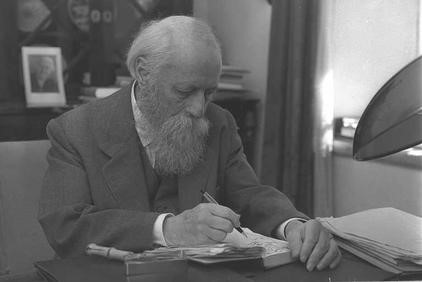Martin Buber is Born

February 8, 1878
Renowned philosopher Martin Buber is born in Vienna. Following his parents’ divorce when he was three years old, Buber would spend much of his childhood in Lemberg, Ukraine where he was raised by his grandparents in a religious home. Buber’s grandfather was a scholar of both Midrash and Greek literature and taught him Hebrew.
Buber became increasingly more interested in philosophy and began to drift away from traditional Judaism, studying philosophy and art history while a student at universities in Leipzig, Vienna and Berlin. He received a Ph.D. in 1904.
While in Leipzig, Buber became involved in the nascent Zionist movement. In 1899, he was a delegate to the third Zionist Congress where he delivered an important address emphasizing the importance of education as opposed to pure propaganda in bringing Jews to the movement. “We must win the whole people for our cause and win them not merely by external agitation but through inner transformation. They must not be Zionists as one is a conservative or a liberal, but as one is a man or an artist. This can be accomplished through ‘inner agitation’ through nourishing Jewish culture … the spirit of the people, its national history, and its national literature, through education of the people.”
In 1901, Herzl appointed Buber as the editor of Die Welt, the official weekly publication of the Zionist movement. After a year, he resigned over differences with Herzl and his preference for promoting cultural Zionism as opposed to political Zionism. Shortly afterwards, he became interested in Hasidism, first as a scholarly pursuit, eventually becoming deeply interested in the religious message of the movement and living among Hasidim in Galicia.
After being dismissed from his position at the University of Frankfurt by the Nazis in 1938, Buber made aliyah and became a professor at the Hebrew University. He was most well-known for his philosophy of dialogue and for his translation of the Hebrew Bible into German.